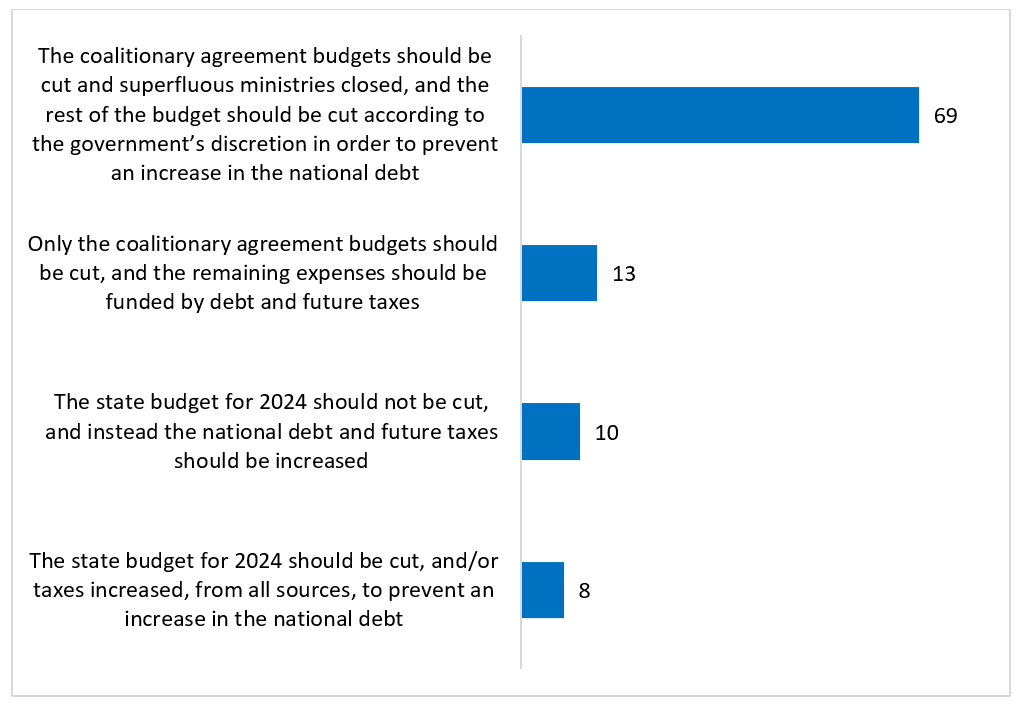IDI Goes In-Depth on the Wartime Budget & Economy
On January 22, 2023, the Israel Democracy Institute released an in-depth survey of Israeli public opinion about the wartime economy; budget; held a conference in partnership with the Institute for National Security Studies (INSS) on the 2024 budgetary priorities.
The Israel Democracy Institute, in partnership with INSS, convened key public sector leaders, alongside IDI and INSS experts, to discuss Israel's defense budget, broader budgetary priorities, and public opinion on Israel's economic issues.
Prof. Karnit Flug, IDI Vice President of Research: "The specified deficit of 6.6% does not leave reasonable margins of safety and does not account for the fact that we might experience a much lower growth rate than anticipated. If the conflict on the Northern front is exacerbated," she continued, "this would mean a significant increase in security expenses and a further reduction in tax revenue."
Prof. Manuel Trajtenberg, INSS Executive Director: “To my knowledge, this is the first time that the war cabinet does not include any effective economic representative. It might be said that economic interests are not being represented at all and this is a serious mistake.”
Click here to read the survey.
Click here to watch the conference in Hebrew.
Key Findings from the Survey:
Many Israelis want coalitionary budgets cancelled or cut due to the war
The respondents were asked what they think should be done regarding the coalitionary budgets (funds agreed upon in forming the government coalition) that were signed as part of the 2023–2024 state budget, given that circumstances have changed significantly since then. Of those who did respond to the question, 63% think that the coalitionary budgets agreed as part of the 2023–2024 budget should be cancelled or cut.
Israelis: increased costs of war should be funded by coalitionary budget cuts; closing superfluous ministries
We asked: “How should the government fund the expected increase in the state budget for 2024, due to the costs of the war?” The majority of respondents (69%) said that “the coalitionary agreement budgets should be cut and superfluous ministries should be closed, and the rest of the budget should be cut according to the government’s discretion, in order to prevent an increase in the national debt.”
How should the government fund the expected increase in the state budget for 2024, due to the costs of the war? (total sample; %)

Health, defense; education have the strongest support for budgetary increases
The interviewees were first presented with the priorities among different policy areas, as approved in March 2023. They were asked the following question: “If it was up to you, for which two areas would you recommend increasing the government budget allocated to them?" The areas for which there is strongest public support for increasing budget allocations are health (42% of respondents), defense (37%), and education (37%).
Half of Israelis dissatisfied with the economy; only 20% satisfied
In response to the question “To what extent are you satisfied with the economic situation in Israel?”, half the respondents (50%) said that they are not satisfied. Meanwhile, 30% gave a score of 3 out of 5, and only 20% said they are satisfied with the economic situation in Israel.
Israelis lean towards dissatisfaction with public services
Asked to rate their satisfaction with public services on a scale of 1-5 (1 is not satisfied at all and 5 is most satisfied), 39% of Israelis gave a rating of 1 or 2, indicating they are not satisfied. By contrast, 22% gave a rating of 4 or 5, indicating they are satisfied, and 39% gave the middle-rating of 3.
Israelis most worried about defense situation; cost of living
The survey found that the issue that worries the public most in the short term (the coming year) is the security situation: 53% cited this as a source of concern. The second most worrying issue for the public in the short term is the high cost of living and housing prices (36%). Next in the ranking of issues of concern in the short term are the economic situation (30%) and the functioning of the government (28%). Personal security is also a concern for the Israeli public, and in particular, for Arab society: 26% of Arabs cited this issue as a major worry in the short term, as did 16% of Jewish respondents.
The survey was carried out with a representative sample of 1,000 men and women, who were interviewed via the internet and by telephone between December 7 and December 24, 2023. The sample comprised 800 Hebrew speakers and 200 Arabic speakers, constituting a nationally representative sample of the adult population in Israel (aged 18 and above).

